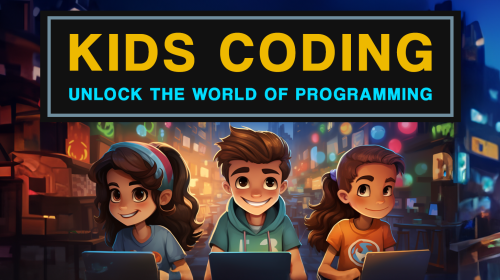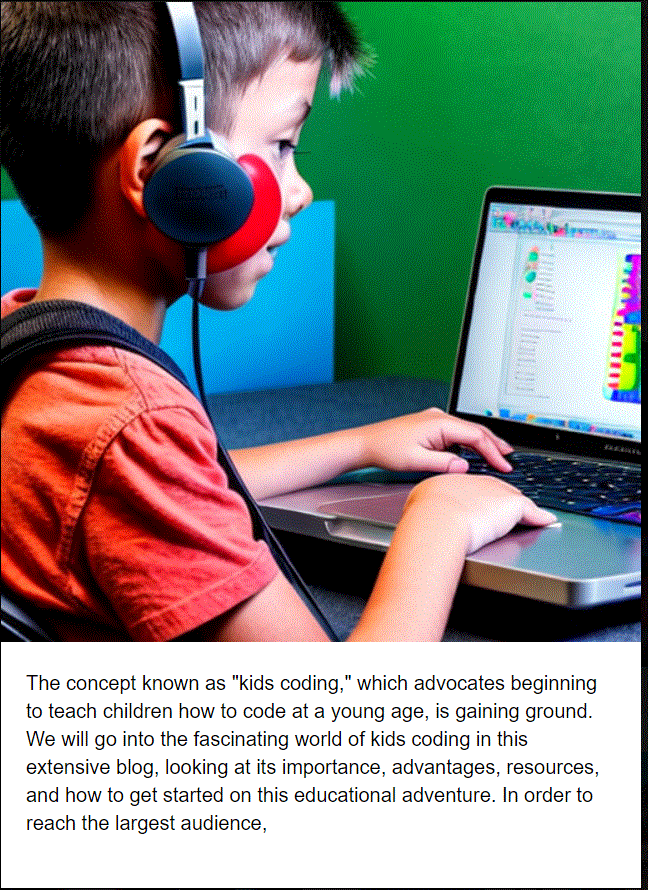





Kids Coding: Unlock the World of Programming
Kids Coding: Unlock the World of Programming for Young Minds
Understanding how computers operate and how to create with them has become crucial knowledge in today’s digital age, as technology affects every aspect of our life. The field of programming, traditionally assumed to be exclusive to adults working in the IT industry, is now welcoming students. The concept known as “kids coding,” which advocates beginning to teach children how to code at a young age, is gaining ground. We will go into the fascinating world of kids coding in this extensive blog, looking at its importance, advantages, resources, and how to get started on this educational adventure.
Why Kids Coding Matters
- Fostering Problem-Solving Skills
Children are introduced to the realm of problem-solving through coding. Programming is all about breaking down difficult issues into manageable, smaller steps, and this strategy can be used in many different spheres of life.
- Making Plans for the Future
The value of coding abilities is rising in a world dominated by technology. Children have an advantage by starting early in their career preparation for STEM (Science, Technology, Engineering, and Mathematics) areas.
- Enhancing Creativity
Coding is not just about logic; it’s also a creative endeavor. It encourages children to think imaginatively, design unique solutions, and bring their ideas to life.
- Boosting Critical Thinking
Kids coding enhances critical thinking by encouraging children to analyze problems, consider multiple solutions, and make informed decisions.
The Benefits of Kids Coding
- Improved Problem Solving
Coding involves identifying issues and devising solutions. As kids code, they develop a logical and systematic approach to problem-solving that can be applied across various disciplines.
- Enhanced Mathematics Skills
Coding often involves mathematical concepts, such as algebra and geometry. Kids who code tend to improve their math skills naturally
- Creative Expression
Coding allows children to create their digital projects, from games and animations to interactive stories. It’s a medium for self-expression and creativity.
- Confidence Building
As children learn to code and see their creations come to life, it boosts their confidence and self-esteem.
Getting Started with Kids Coding
- Age-Appropriate Resources
Start with resources designed specifically for kids, such as visual programming languages like Scratch and Blockly. These platforms use block-based coding, which simplifies programming concepts.
- Interactive Coding Classes
Many online and in-person coding classes cater to kids. Look for programs that are engaging and age-appropriate.
- Parental Involvement
Parents can play a crucial role by encouraging and participating in coding activities with their children. Learning together can be a bonding experience.
- Educational Games and Apps
There are numerous coding games and apps designed to make learning to code enjoyable. Games like “CodeCombat” and apps like “Tynker” are excellent choices.
Exploring Coding Languages for Kids
- Scratch
Scratch is a beginner-friendly visual programming language developed by MIT. It uses block-based coding, making it accessible to kids as young as seven years old.
- Blockly
Blockly is another visual programming language suitable for children. It allows them to drag and drop blocks to create code, making it easy to understand and use.
- Python
Python is a text-based programming language appropriate for older children (often 12 years and older). The ability to speak this language is highly valued in the field.
Encourage a growth mindset by praising effort and persistence rather than innate talent. Teach kids that making mistakes is a natural part of coding and an opportunity to learn.
Coding Resources for Parents and Educators
It’s essential to equip parents and educators with the knowledge and tools to support kids coding.
Challenges in Kids Coding and How to Overcome Them
- Limited Access to Technology
Not all children have access to computers or the internet at home. Schools and libraries can bridge this gap by providing computer access and coding classes.
- Lack of Diversity
The tech industry has struggled with diversity. Encouraging kids from underrepresented groups to code can help bridge this gap and create a more inclusive tech community.
- Gender Stereotypes
Girls can face gender stereotypes that discourage them from pursuing coding. Efforts to encourage girls to code and promoting female role models in tech can help combat these stereotypes.
Success Stories: Kids Who’ve Excelled in Coding
Share inspiring stories of young coders who have achieved remarkable feats, such as creating apps, winning coding competitions, or even starting their companies.
The Future of Kids Coding
- Integrating Coding into Education
Many countries are recognizing the importance of coding and are integrating it into their educational curricula, ensuring that future generations are well-prepared for the digital age.
- The Rise of Coding Camps
Coding camps and summer programs are becoming increasingly popular, providing kids with immersive coding experiences.
- The Role of EdTech: Educational technology (EdTech) companies are creating innovative tools and platforms to make learning to code even more engaging and accessible for kids.
Conclusion: Empowering Young Minds with Coding
Kids coding is not just about learning new skill; it’s about equipping the next generation with the tools they need to thrive in an increasingly digital world. By introducing children to coding at young age, we empower them to think critically, solve problems, and express their creativity. As coding continues to shape our world, nurturing this skill in our children ensures that they will be active participants in the digital revolution, shaping the future with their ideas and innovations. So, whether you’re parent, young coder and educator, remember that the world of programming is a vast and exciting playground waiting to be explored. Embrace it, and who knows what incredible creations you might bring to life!
Get Kids Coding Now by clicking the below Link.
Click Here
 |
Kids Coding: Unlock the World of Programming |
FAQs
- At what age can children start learning to code?
Children as young as five or six can begin learning basic coding concepts through visual programming languages like Scratch. However, the ideal starting age may vary from child to child based on their interest and readiness.
2. What is kids coding?
Children are taught the principles and abilities of computer programming and coding languages in a kid-friendly and age-appropriate way through the practice of kids coding, also known as coding for kids or child programming.
- Why is kids coding important?
Kids coding is essential because it nurtures problem-solving skills, enhances creativity, boosts critical thinking, and prepares children for future careers in technology and STEM fields.
- What programming languages are suitable for kids?
For younger kids, visual programming languages like Scratch and Blockly are excellent choices. As they progress, they can transition to text-based languages like Python, which is beginner-friendly.
- Do children need access to a computer to learn coding?
Even though having access to a computer is useful, it is not always required. For tablets and smartphones, there are numerous coding apps and games that make coding more accessible to a wider audience.
- How can parents and educators support kids in learning to code?
Parents and educators can support kids by providing access to coding resources, enrolling them in coding classes, encouraging experimentation, and fostering a growth mindset by praising effort and persistence.
- Are there any gender-specific challenges in kids coding?
Gender stereotypes can sometimes discourage girls from pursuing coding. Efforts to promote gender diversity in coding and highlight female role models in tech are important for overcoming these challenges.
- What are some success stories of kids excelling in coding?
There are numerous inspiring stories of young coders who have created apps, won coding competitions, and even started their businesses. These stories serve as motivation for aspiring young coders.
9. How is coding being integrated into education systems?
Many countries are integrating coding into their educational curricula to ensure that students are exposed to coding concepts from an early age. Coding education is becoming more common in schools worldwide.
Get Kids Coding Now by clicking the below Link.
Click Here
 |
Kids Coding: Unlock the World of Programming |









